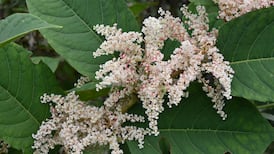Take one large and semi-derelict site (1.06 hectares) in the heart of Dublin city, put it to use in a way that helps bring health and happiness to as many people as possible, and what have you got?
In the case of Pearse College of Further Education in Crumlin, the answer is allotments – lots and lots and lots of them.
Or, to be more precise, 133 separate parcels of land, each measuring 80sq m, and almost every one of them a properly productive kitchen garden in its own right.
0 of 9
As for the community of gardeners who tend to them, this diverse group of Dubliners numbers somewhere between 130-250 individuals and represents a vibrant cross-section of the city’s population brought together through a shared love of growing their own food.
Land – its value, its worth, its usefulness to the building industry – may have become something of a national fetish during the boom years and yet there can’t be many spots in the capital as productive as this patch of soil, not just as regards the food it grows, but also in terms of human well-being.
Take a stroll along its grid of narrow pebble paths at this time of year and everywhere you look are flowers, fruit and vegetables – tangles of perfumed sweet pea, ripening tomatoes, tasselled heads of sweet corn, feathery lines of carrots and neat drills of potatoes, all set against the backdrop of nearby housing estates and to the soundtrack of the rattling wind turbine which powers the site’s water supply.
Take a second, closer look and you’ll spot the plot-holders themselves sprinkled out across the sprawling, sloping ground, heads down, bottoms in the air, each one of them engrossed in their own world, each plot a separate universe unto itself.
If they’re not doing that, then they’re chatting convivially together either side of the bottle-green, waist-high windbreak netting that serves as the allotment version of the garden fence, carving the land up into its 133 constituent parts. Or they’re taking a break from their labours to enjoy a mug of hot tea together in the communal picnic area.
In 2008 this same patch of ground was a wasteland filled with a jumble of vandalised, burnt-out buildings. And then someone – a teacher taking part in one of the college’s regular staff brainstorming sessions – suggested the idea of a garden. The proposal struck an immediate chord with Jackie Nunan, the college’s newly-appointed principal.
“We’ve always run a variety of horticultural courses at Pearse College so the idea of becoming an allotment provider seemed a very natural progression.”
By early 2009, and with the help and support of students, local allotment groups, as well as Dublin City Council and the VEC (the latter provided key funding), the college was in a position to send the diggers in. A year later the site opened for business and since then there's been a waiting list of people eager to take on a plot.
The ways in which those 133 plots are gardened are as diverse as the people who garden them. The majority are tended by individuals or families living in the local area, as well as students, but there are also a handful that are cultivated by local groups.
One of these caters for people with disabilities (D12dmap), another for recovering addicts (ARC), a third is a meeting place for local men (Rialto Men’s Group). There are “no-dig” plots as advocated by the English gardener Charles Dowding, as well the more traditional “double-dig” plots. Some are organically managed, others not.
There are plots that are arranged in neat lines, or carved into a series of smart, timber-edged beds, and others that are a higgledy-piggledy explosion of growth where giant sunflowers are squeezed next to golden pumpkins and wigwams of scarlet runner beans. But what every one of them shares is the fact that they provide sustenance, both for the body and the mind.
Many of Pearse College’s plot-holders are members of the flourishing Dublin Community Growers group (dublincommunitygrowers.ie), a network of the city’s gardeners who meet every month to share knowledge, experience and advice as well as to promote the idea of a “vibrant green Dublin and a healthy garden movement”.
This month the group is in celebratory mood. Not only has this year's fine summer resulted in a great harvest, but next Saturday (September 14th) sees the launch of the 2013 Dublin Harvest Festival, a free event taking place in Wolfe Tone Park, Jervis Street, that will bring together the city's many green-fingered community gardeners and allotment holders. There'll be workshops on bee-keeping, apple-pressing and how to make seed bombs, as well as a pop-up garden, cookery demonstrations and flower-pot painting, all with the aim of helping people to "green the city from the roots up". It sounds like fun.




















